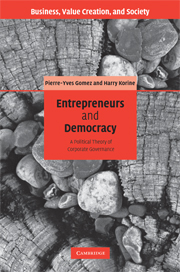Book contents
- Frontmatter
- Contents
- List of figures and tables
- Foreword
- Introduction
- Part I Establishing the ideological foundations: the contribution of liberal political philosophy
- Part II Understanding how corporate governance evolves: the contribution of history
- Introduction to Part II
- 3 Familial governance (c.1800–1920): economic enfranchisement and the founder as entrepreneur
- 4 Managerial governance (c.1920–1970): separation of powers and management as entrepreneur
- 5 Post-managerial governance (from c.1970): ownership of the large corporation reaches unprecedented mass and fragments into multiple poles
- 6 Interpreting public governance: representation and debate signify a new step towards democratization
- Conclusion to Part II
- Part III Corporate governance and performance: the contribution of economics
- Conclusion to Part III
- Epilogue
- Index
4 - Managerial governance (c.1920–1970): separation of powers and management as entrepreneur
Published online by Cambridge University Press: 22 September 2009
- Frontmatter
- Contents
- List of figures and tables
- Foreword
- Introduction
- Part I Establishing the ideological foundations: the contribution of liberal political philosophy
- Part II Understanding how corporate governance evolves: the contribution of history
- Introduction to Part II
- 3 Familial governance (c.1800–1920): economic enfranchisement and the founder as entrepreneur
- 4 Managerial governance (c.1920–1970): separation of powers and management as entrepreneur
- 5 Post-managerial governance (from c.1970): ownership of the large corporation reaches unprecedented mass and fragments into multiple poles
- 6 Interpreting public governance: representation and debate signify a new step towards democratization
- Conclusion to Part II
- Part III Corporate governance and performance: the contribution of economics
- Conclusion to Part III
- Epilogue
- Index
Summary
Since Berle and Means, it has become a commonplace to state that the family corporation (owned by the family and governed according to the model described in the preceding chapter) declined with the emergence of the very large corporation. Since the middle of the twentieth century, this evolution from familial capitalism to managerial capitalism has been studied extensively, and we will of course refer to the authoritative findings of this research. However, in the context of this book, we also want to offer our own perspective on the following question: why was the large, modern enterprise incompatible with the familial model of governance? In other words, what were the factors that contributed to undermining the traditional legitimacy of the family and to strengthening the new managerial legitimacy based on expertise and knowledge, to the point that the latter model of governance came to be universally accepted as the standard for the large modern corporation? In order to understand the complex interplay of forces that results in the replacement of one model of governance by another, it is necessary to explore how the balance of forces breaks and reforms. At the conclusion of the preceding chapter, we observed that the familial model, although founded as an offspring of the modern liberal project also, contained seeds of contradiction with liberalism. In this chapter, we will describe how these contradictions played out and advance two sets of reasons for the decline and demise of familial governance.
- Type
- Chapter
- Information
- Entrepreneurs and DemocracyA Political Theory of Corporate Governance, pp. 99 - 135Publisher: Cambridge University PressPrint publication year: 2008



